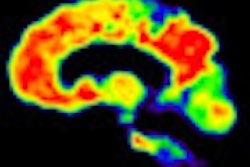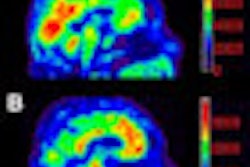Several studies at the just-concluded Society of Nuclear Medicine (SNM) meeting in Miami Beach, FL, looked at the presence of beta-amyloid plaque in healthy patients, and in those exhibiting only minor symptoms of cognitive decline. Having elevated levels of the Alzheimer's-associated protein doesn't guarantee that an individual will suffer from cognitive decline or progress to Alzheimer's disease, but it makes it more likely, researchers said.
A diagnosis of Alzheimer's disease can now be made when the patient first presents with symptoms and still has largely preserved mental function, said Dr. Christopher Rowe, a lead investigator in the Australian Imaging, Biomarkers, and Lifestyle Flagship Study of Aging (AIBL) and professor of nuclear medicine at Austin Hospital in Melbourne, Australia, in a statement accompanying release of the studies.
Previously, there was an average delay of three years between consulting a doctor over memory concerns and the diagnosis of Alzheimer's, as the diagnosis required the presence of dementia, he said. But molecular imaging, used as an adjunct to other diagnostic measures, can help lead to earlier diagnosis, potentially giving patients years to prepare for dementia while they still have control over their destiny.
In one study, researchers acquired PET images using F-18 florbetaben, which binds to amyloid in the brain, in conjunction with clinical and neuropsychological testing to evaluate the effect of plaque in the brains of older individuals with cognitive impairment. Patients with high levels of plaque and atrophy of the hippocampus had an 80% chance of developing Alzheimer's disease within two years, the group concluded.
Another study compared PET agent carbon-11-labeled Pittsburgh Compound B (C-11 PiB) with F-18 FDG for detecting amyloid plaque. Results showed that C-11 PiB was superior for evaluating amyloid patterns of the brain. Fifteen percent of the 100 healthy participants were found to have some amyloid plaque buildup, the researchers said.




















